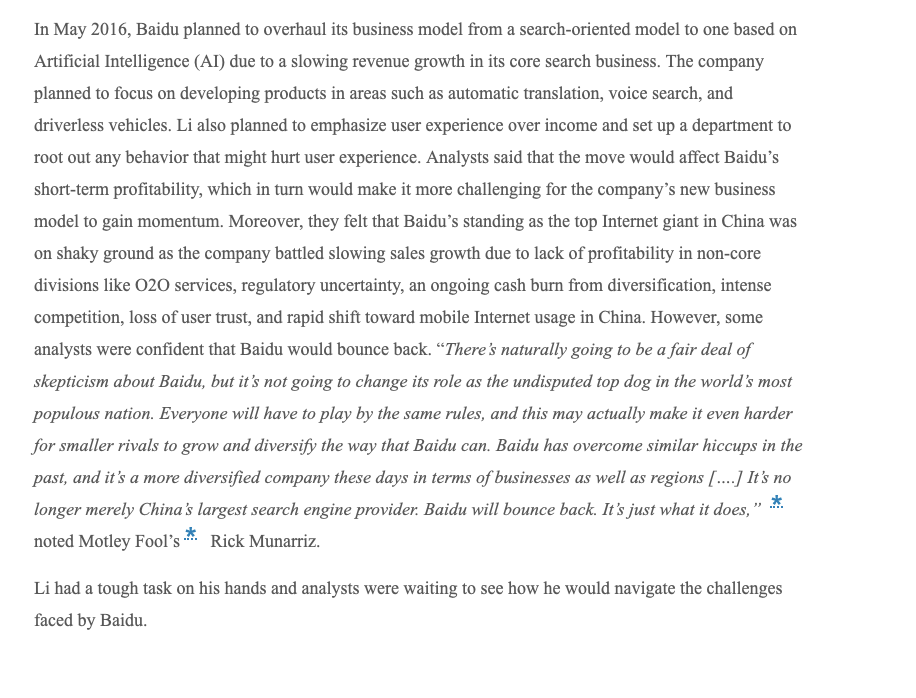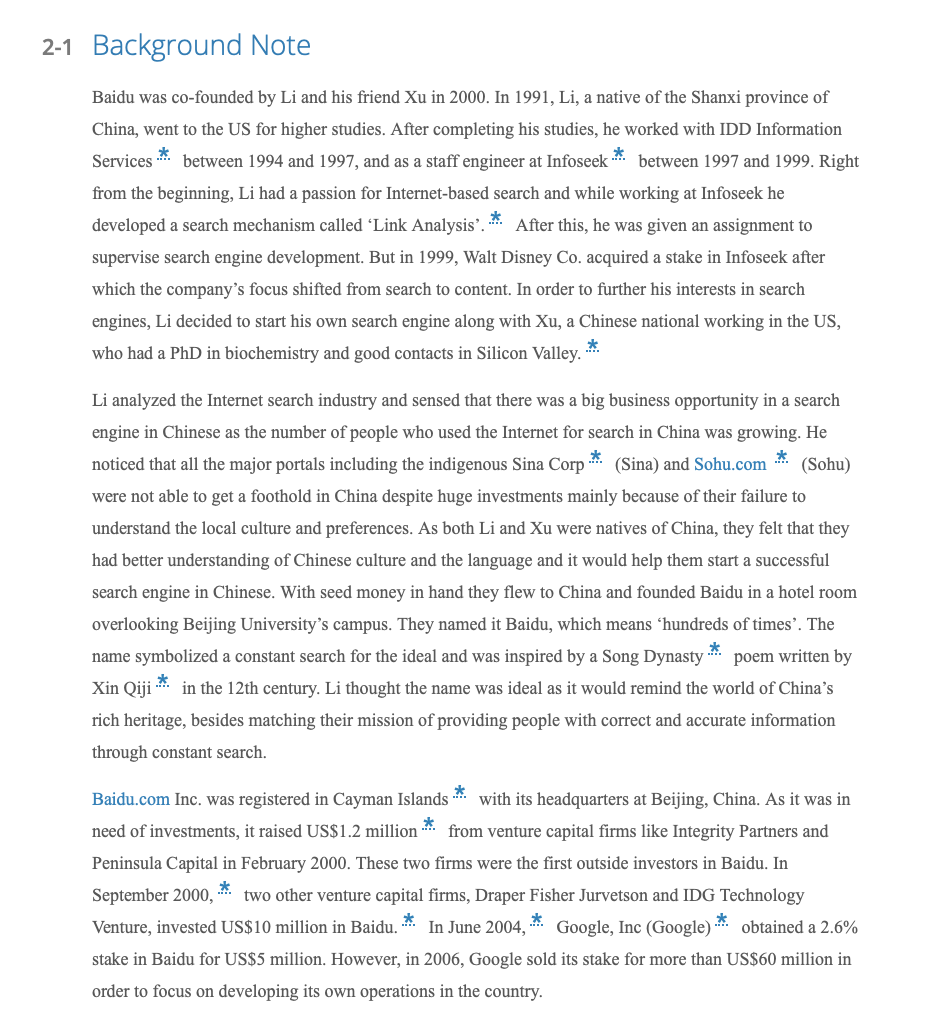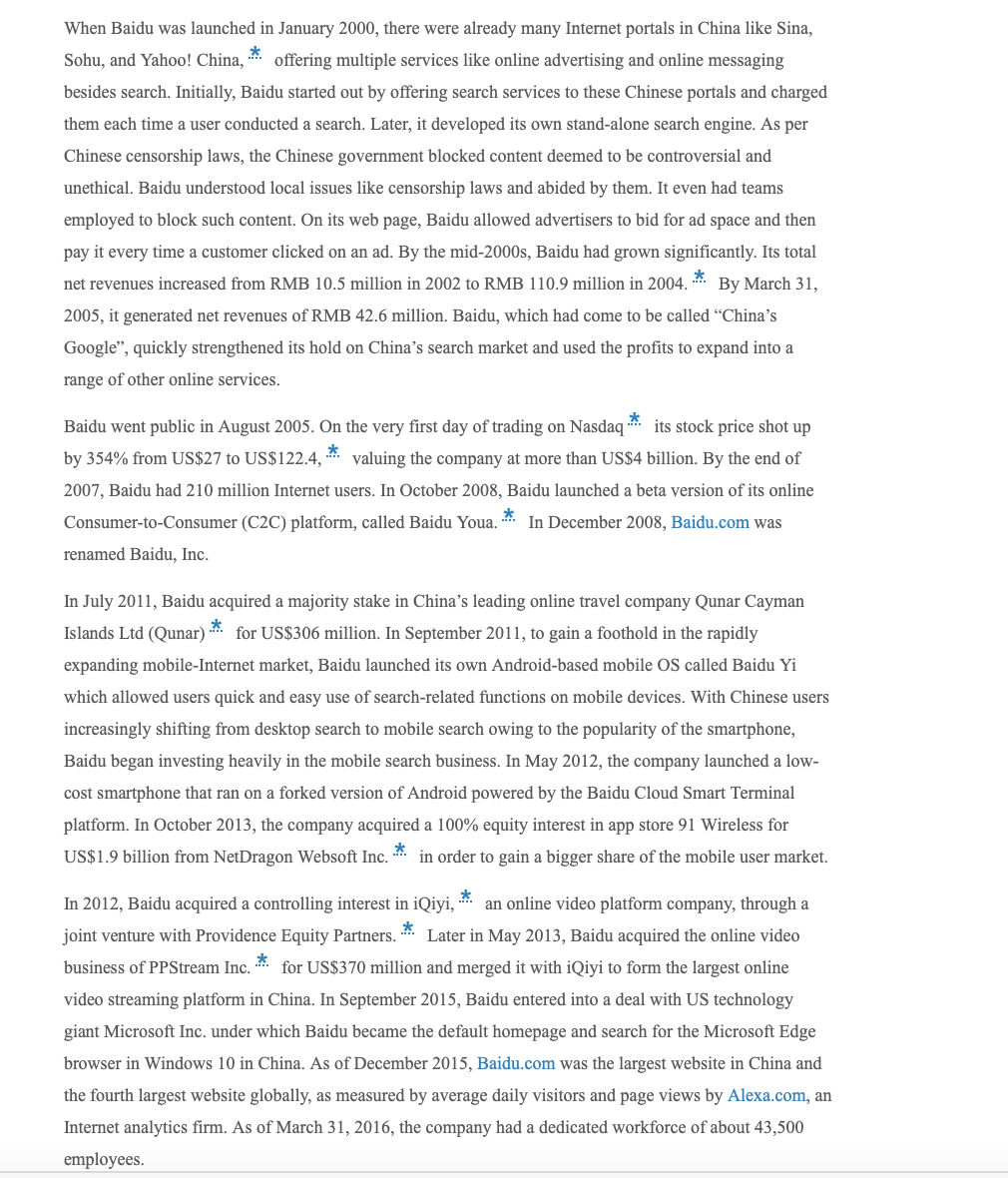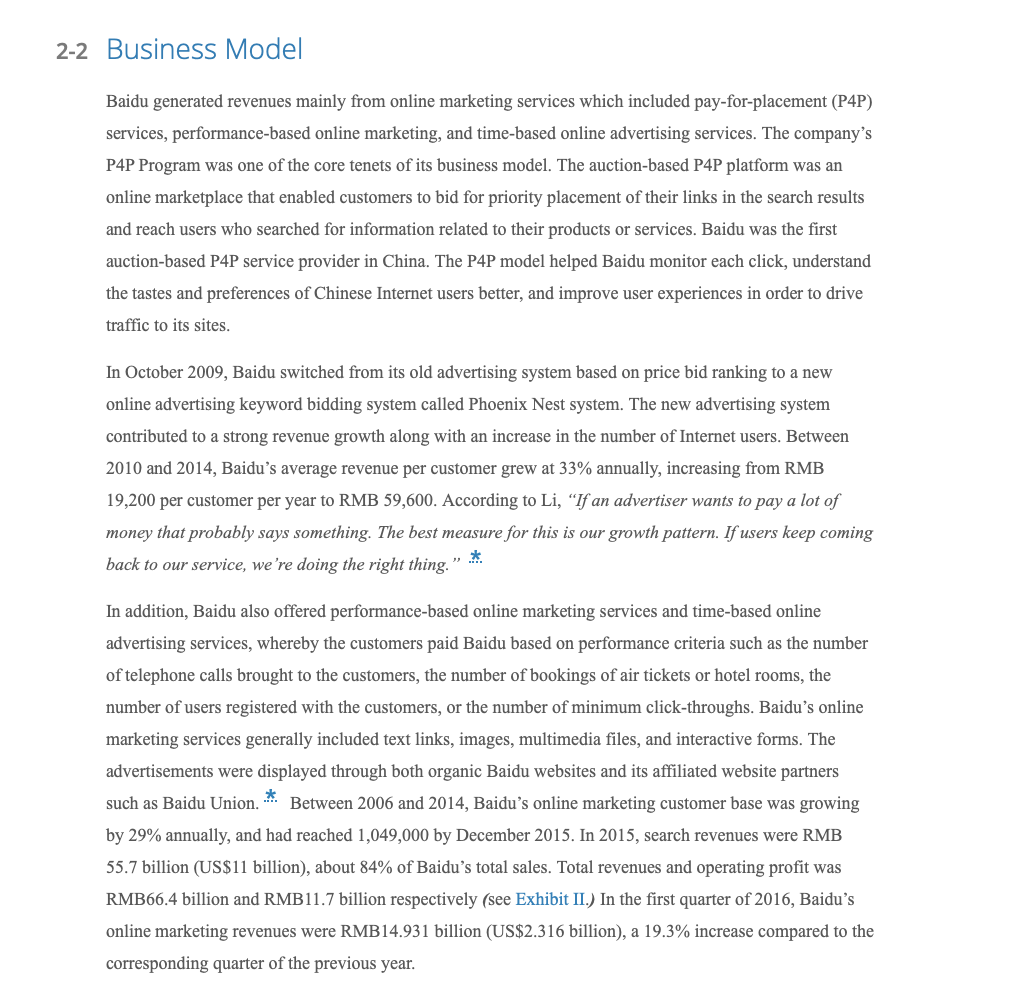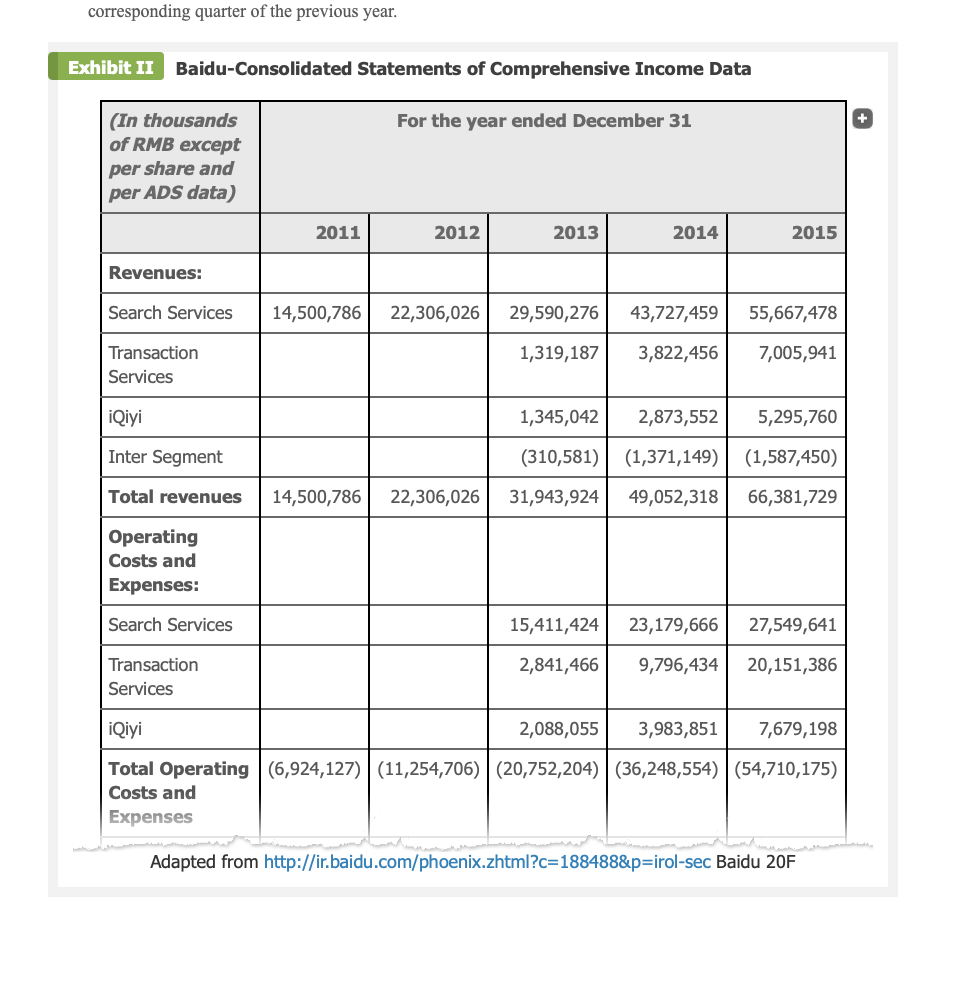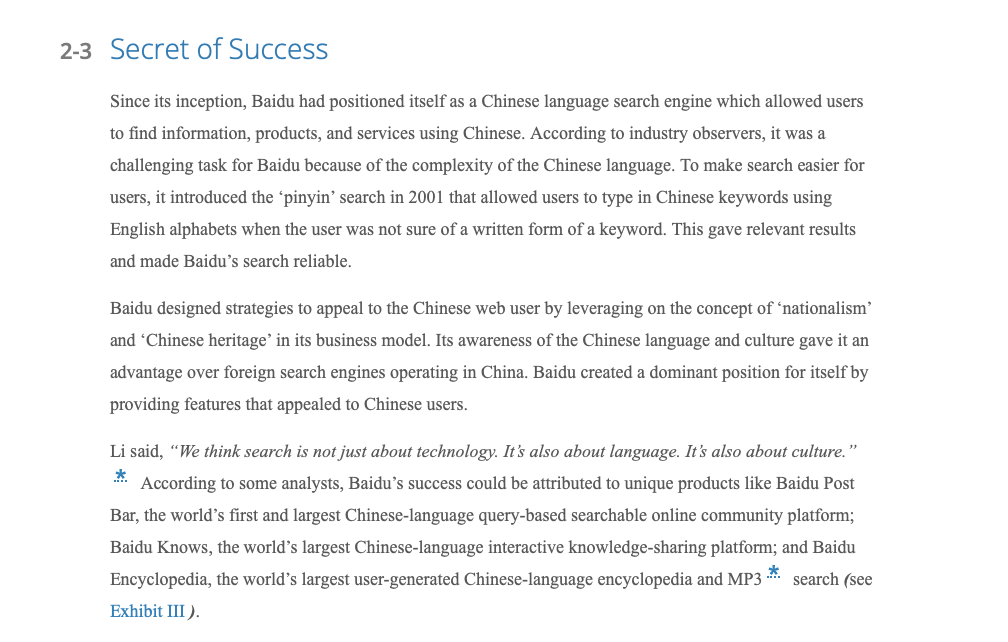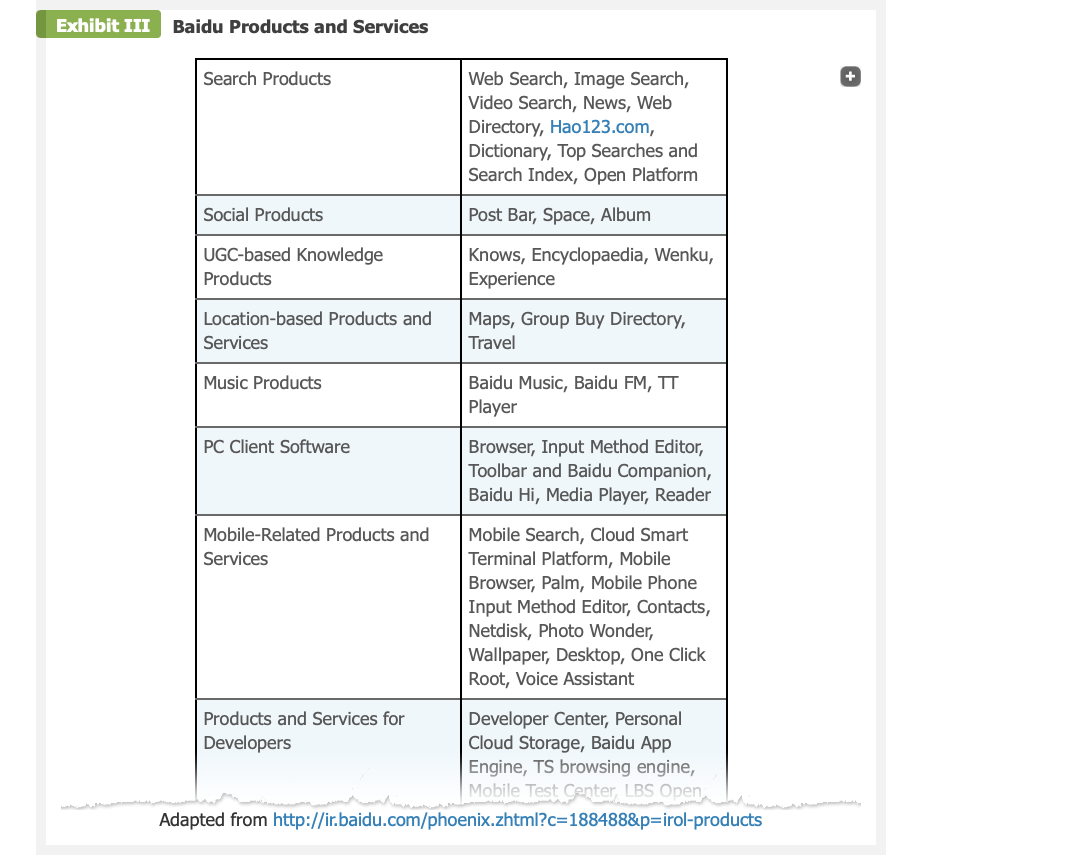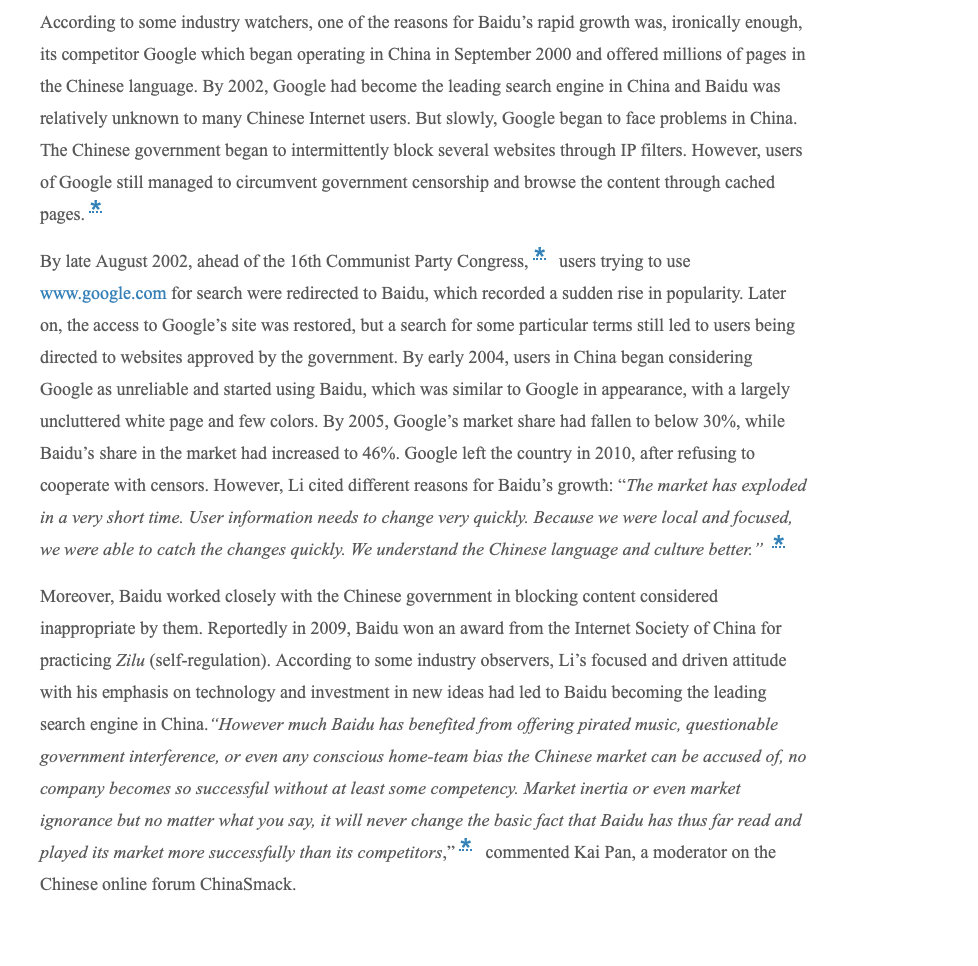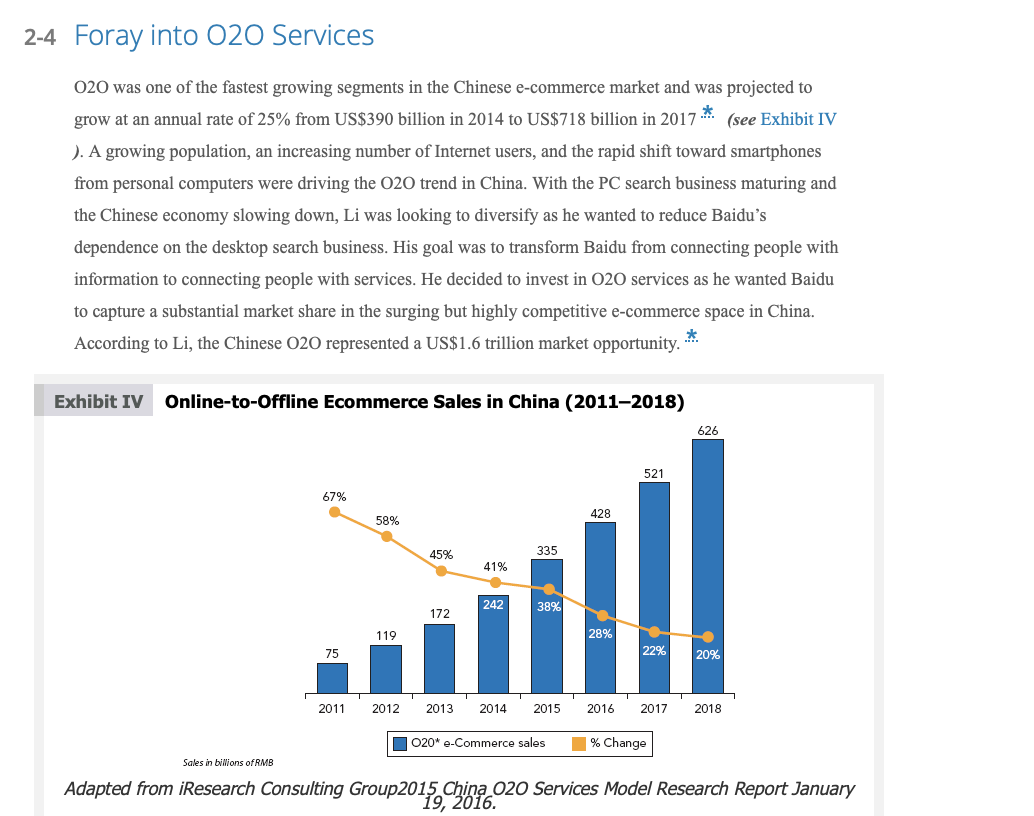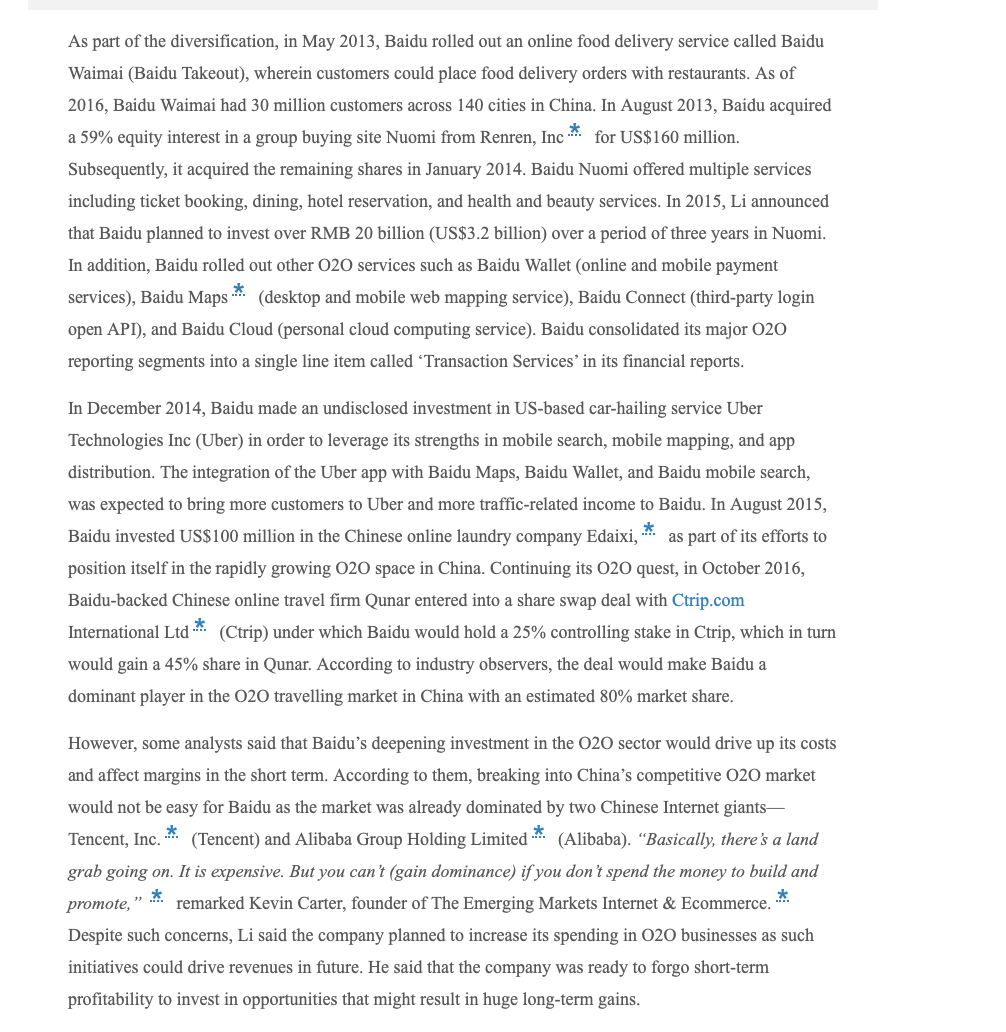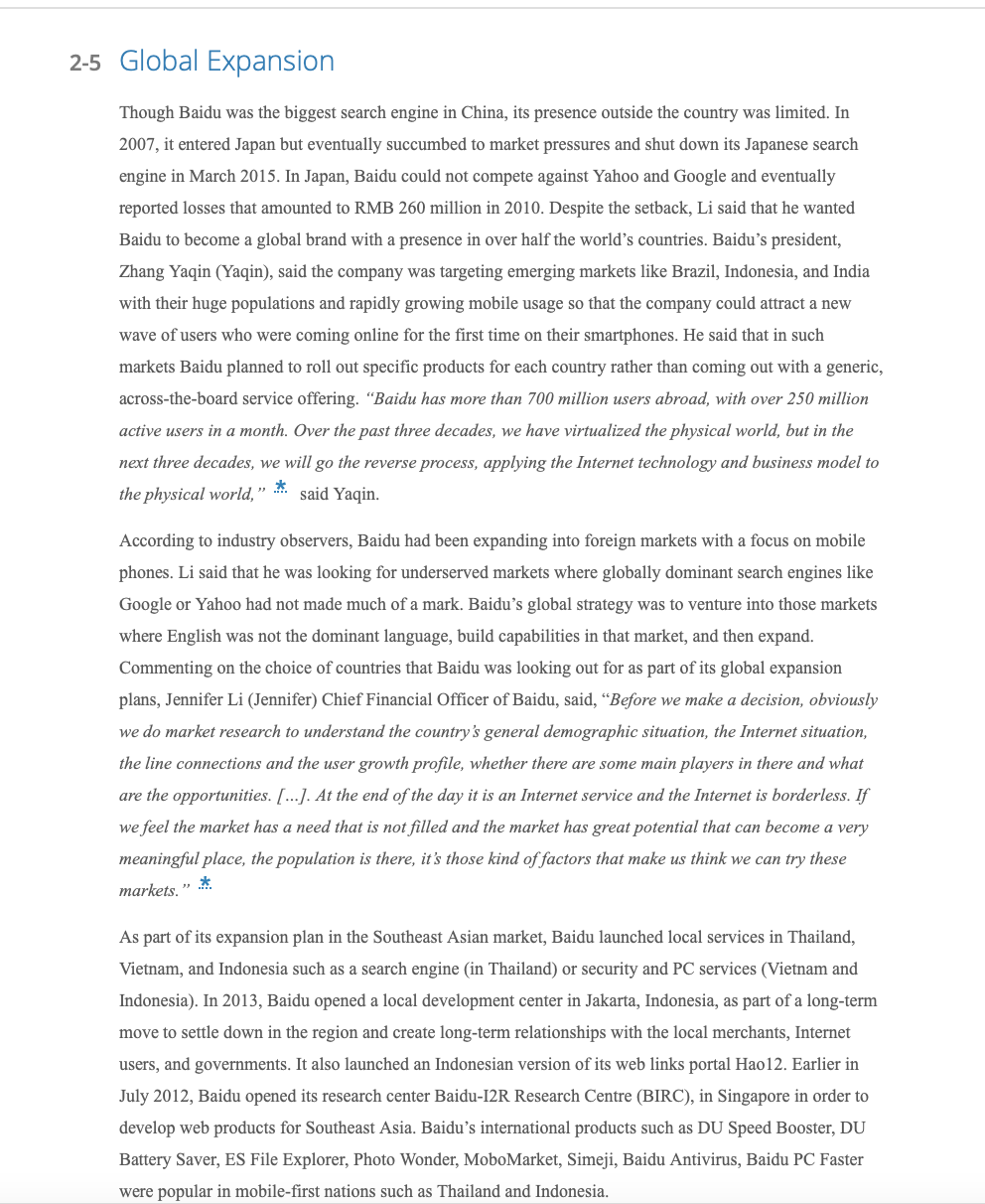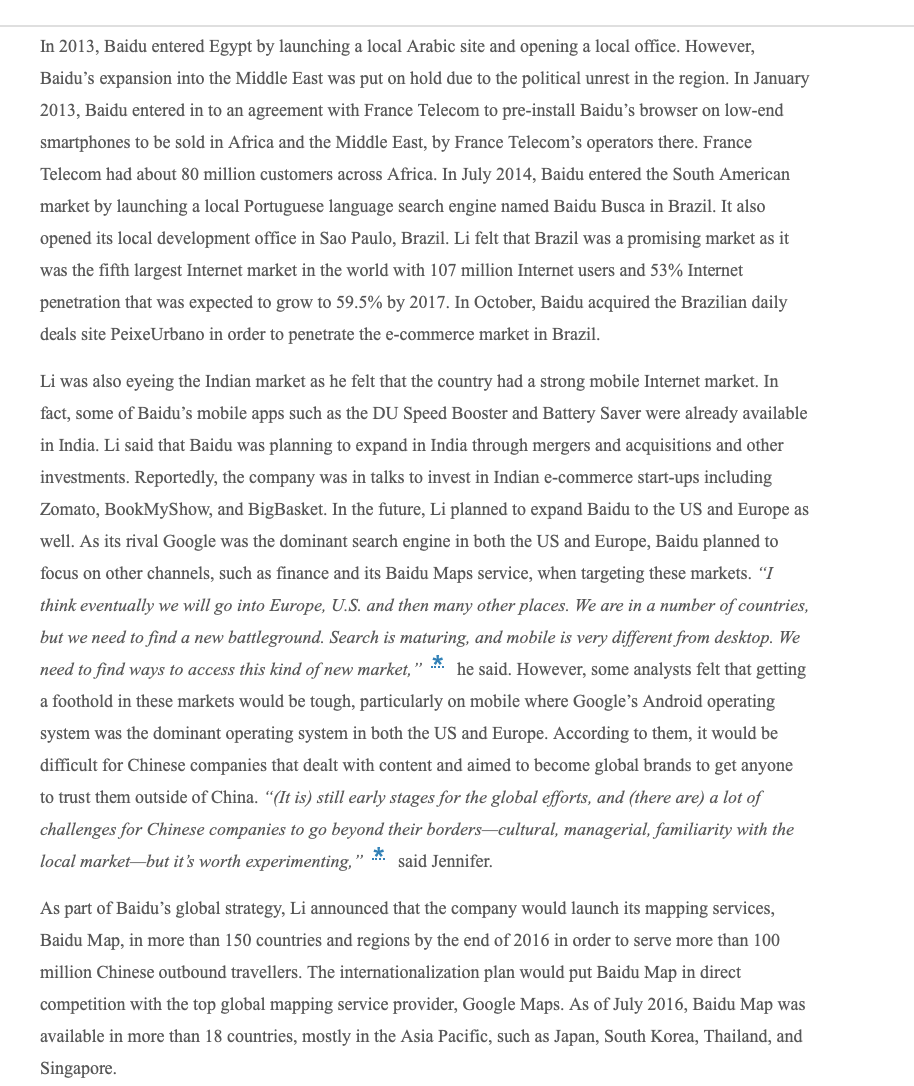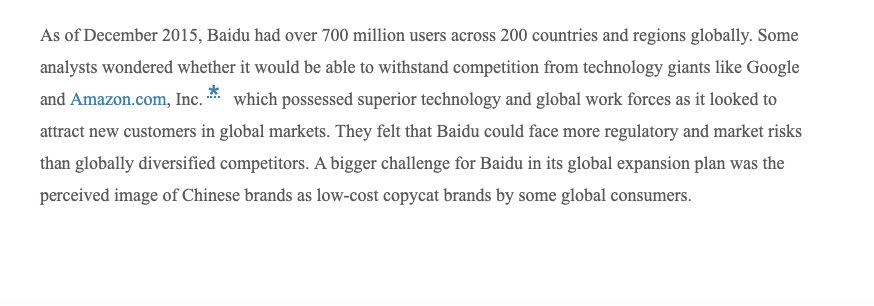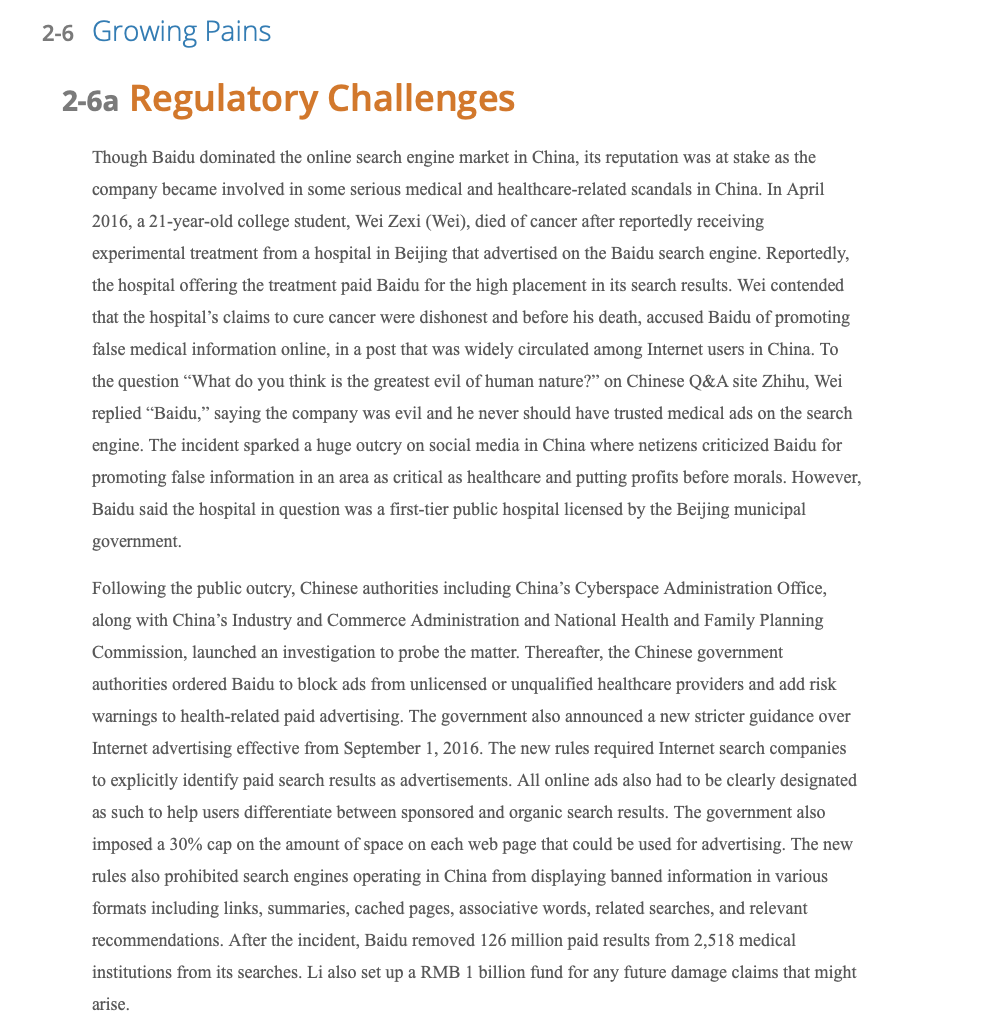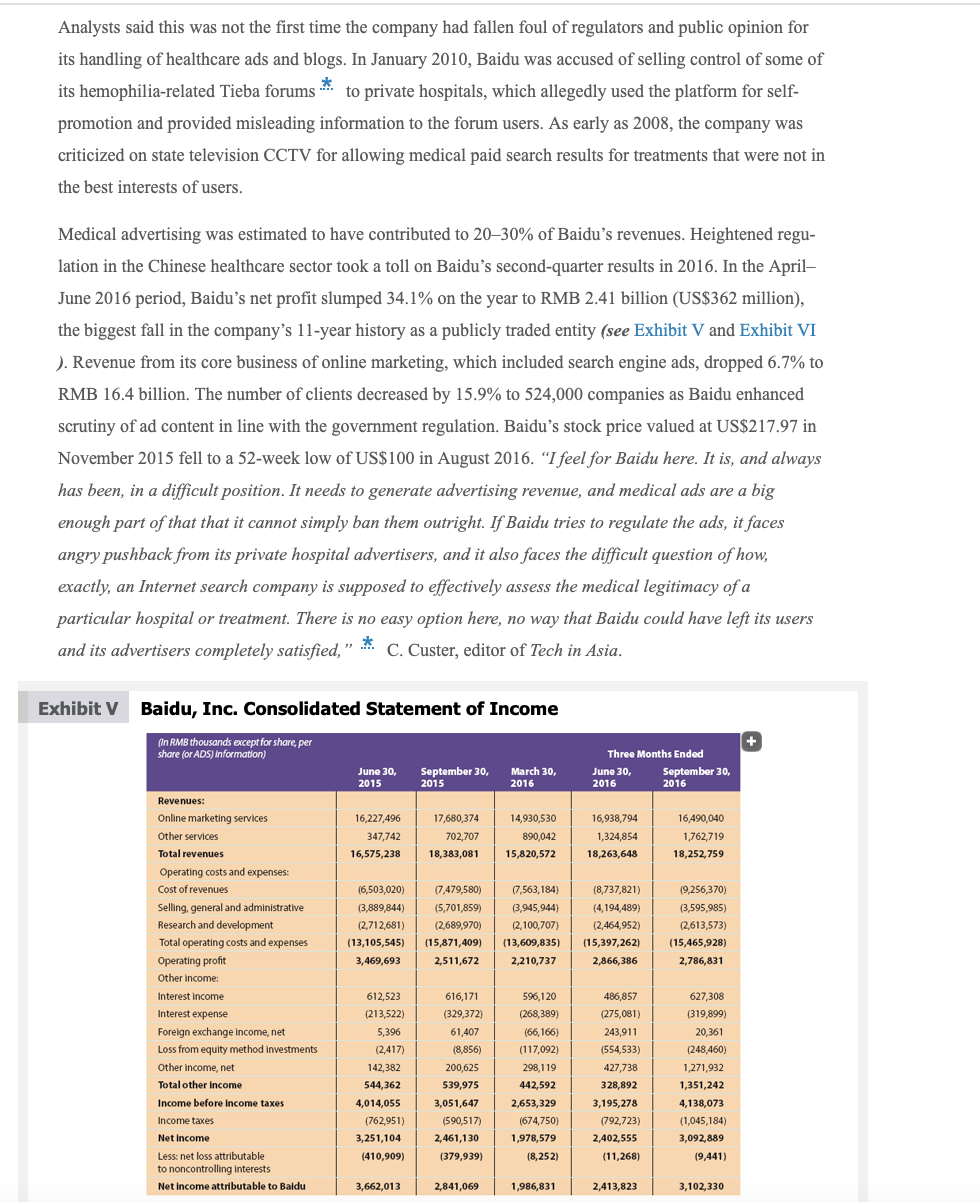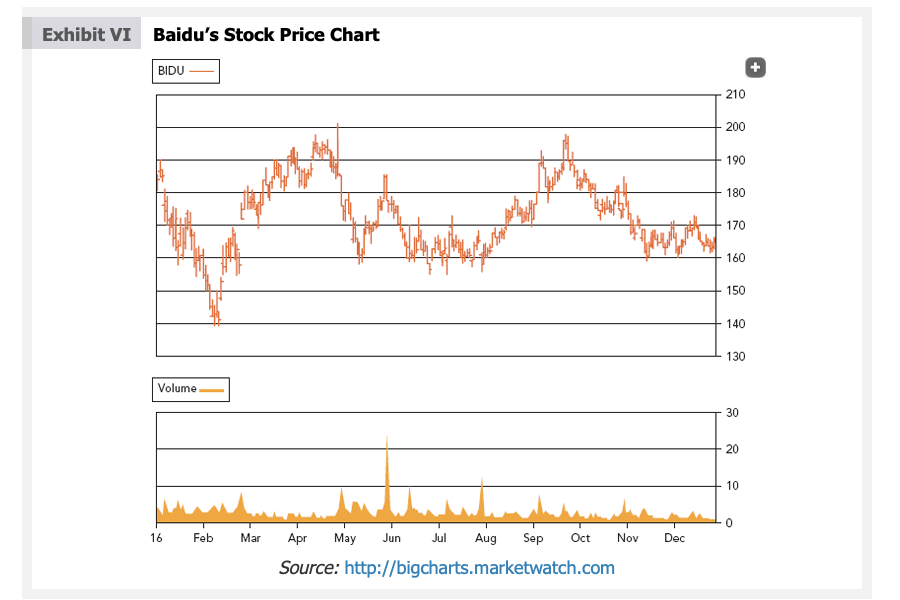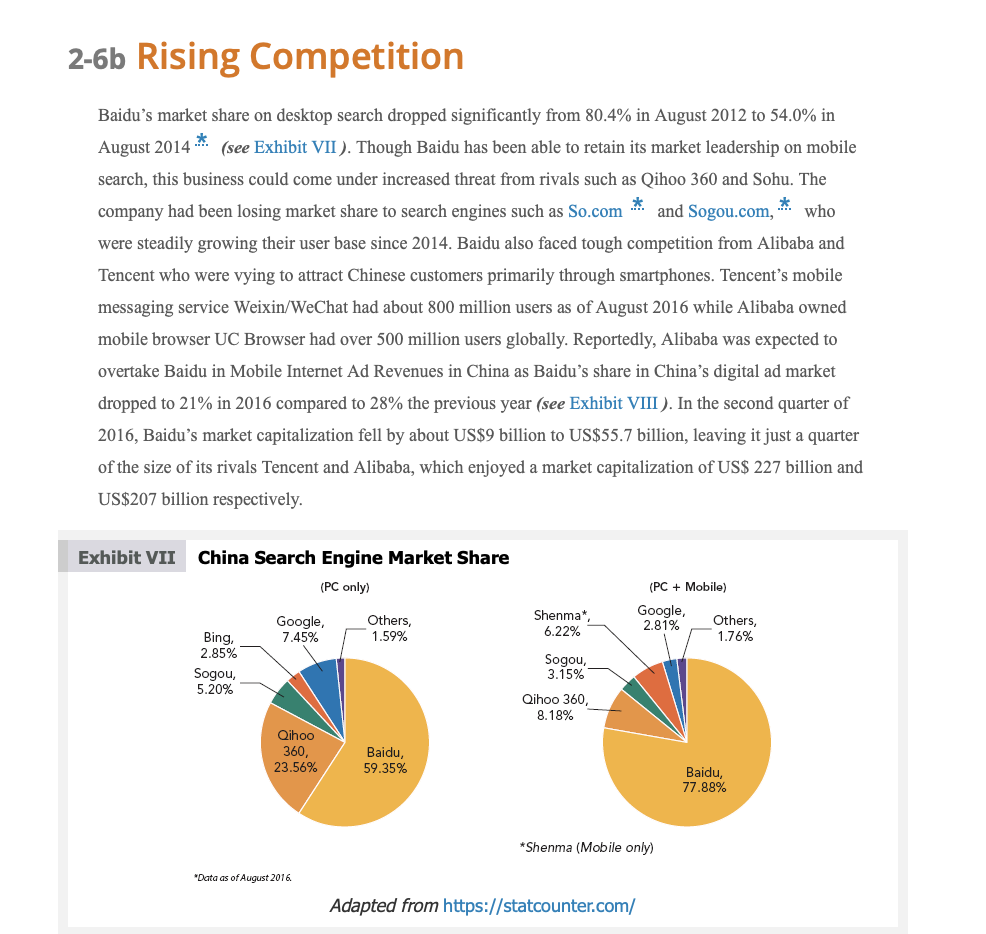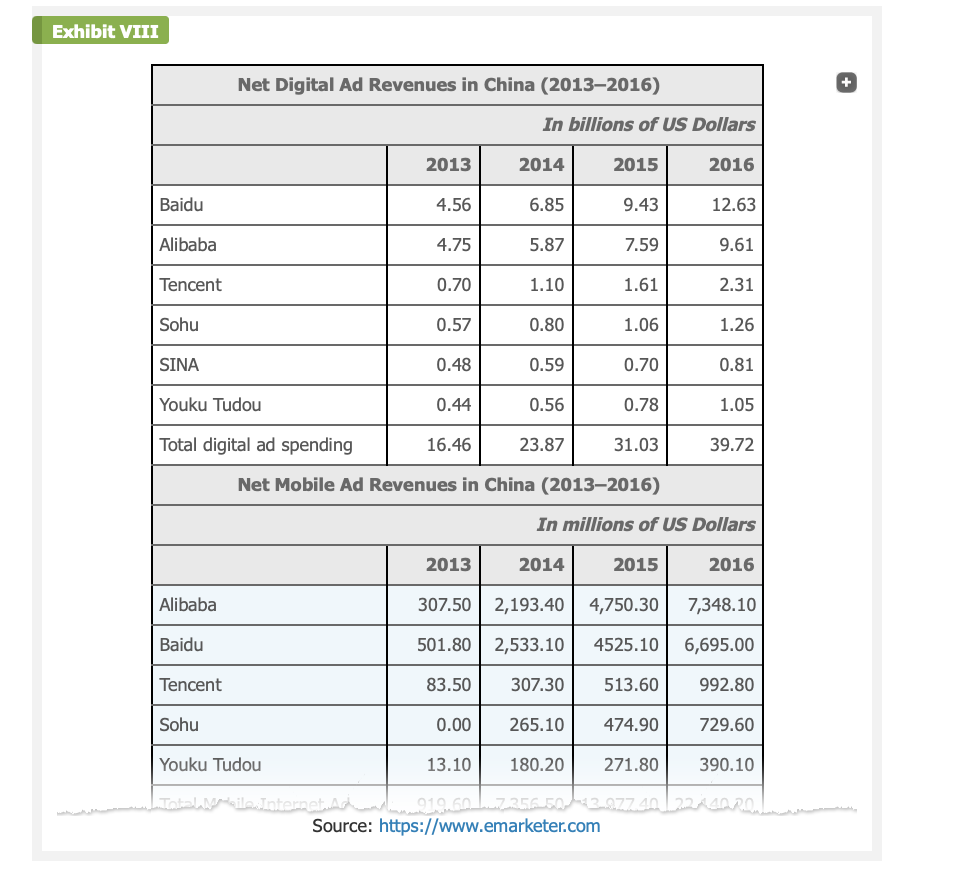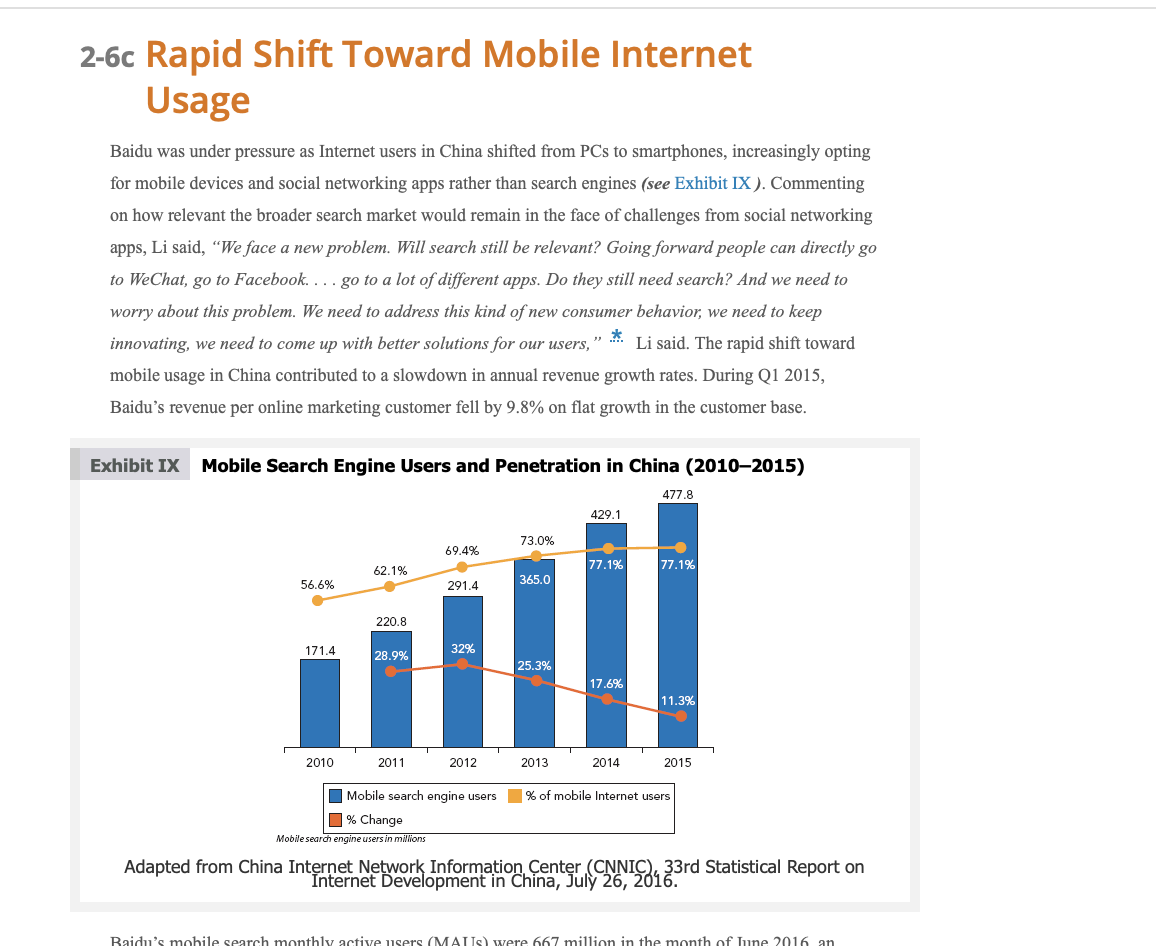1. What are the most important 1-2 general environment factors to be considered for the INDUSTRY and what is their effect (positive-negative-neutral)?
2)What are the most important 1-2 of the five industry forces affecting the INDUSTRY and what is their effect (high-moderate-low Is the industry attractive for new entrants AND for incumbents?
3)List TWO major strategic group competitors and briefly predict the significant future action(s) of EACH competitor.
4)What are the most important 1-2 of the eight value chain areas for the company?What is your evidence for their importance?Are they superior, inferior or neutral vs. EACH of the two major competitors?
5. What are themost significant financial factor (be specific, calculating and presenting in a three-year line chart the most important 1-2 ratios in the profitability, leverage and/or activity areas compared to your two strategic group competitors (or the industry) and non-financial factor(s) (leadership, culture, ethics/social responsibility) for the company?
In May 2016, Baidu planned to overhaul its business model from a search-oriented model to one based on Artificial Intelligence (AI) due to a slowing revenue growth in its core search business. The company planned to focus on developing products in areas such as automatic translation, voice search, and driverless vehicles. Li also planned to emphasize user experience over income and set up a department to root out any behavior that might hurt user experience. Analysts said that the move would affect Baidu's short-term profitability, which in turn would make it more challenging for the company's new business model to gain momentum. Moreover, they felt that Baidu's standing as the top Internet giant in China was on shaky ground as the company battled slowing sales growth due to lack of profitability in non-core divisions like 020 services, regulatory uncertainty, an ongoing cash burn from diversification, intense competition, loss of user trust, and rapid shift toward mobile Internet usage in China. However, some analysts were confident that Baidu would bounce back. "There's naturally going to be a fair deal of skepticism about Baidu, but it's not going to change its role as the undisputed top dog in the world's most populous nation. Everyone will have to play by the same rules, and this may actually make it even harder for smaller rivals to grow and diversify the way that Baidu can. Baidu has overcome similar hiccups in the past, and it's a more diversified company these days in terms of businesses as well as regions [....] It's no longer merely China's largest search engine provider. Baidu will bounce back. It's just what it does," .. noted Motley Fool's . Rick Munarriz. Li had a tough task on his hands and analysts were waiting to see how he would navigate the challenges faced by Baidu.2-1 Background Note Baidu was co-founded by Li and his friend Xu in 2000. In 1991, Li, a native of the Shanxi province of China, went to the US for higher studies. After completing his studies, he worked with IDD Information Services . between 1994 and 1997, and as a staff engineer at Infoseek . between 1997 and 1999. Right from the beginning, Li had a passion for Internet-based search and while working at Infoseek he developed a search mechanism called 'Link Analysis'. ". After this, he was given an assignment to supervise search engine development. But in 1999, Walt Disney Co. acquired a stake in Infoseek after which the company's focus shifted from search to content. In order to further his interests in search engines, Li decided to start his own search engine along with Xu, a Chinese national working in the US, who had a PhD in biochemistry and good contacts in Silicon Valley. .. Li analyzed the Internet search industry and sensed that there was a big business opportunity in a search engine in Chinese as the number of people who used the Internet for search in China was growing. He noticed that all the major portals including the indigenous Sina Corp . (Sina) and Sohu.com . (Sohu) were not able to get a foothold in China despite huge investments mainly because of their failure to understand the local culture and preferences. As both Li and Xu were natives of China, they felt that they had better understanding of Chinese culture and the language and it would help them start a successful search engine in Chinese. With seed money in hand they flew to China and founded Baidu in a hotel room overlooking Beijing University's campus. They named it Baidu, which means 'hundreds of times'. The name symbolized a constant search for the ideal and was inspired by a Song Dynasty .. poem written by Xin Qiji . in the 12th century. Li thought the name was ideal as it would remind the world of China's rich heritage, besides matching their mission of providing people with correct and accurate information through constant search. Baidu.com Inc. was registered in Cayman Islands .. with its headquarters at Beijing, China. As it was in need of investments, it raised US$1.2 million . from venture capital firms like Integrity Partners and Peninsula Capital in February 2000. These two firms were the first outside investors in Baidu. In September 2000, . two other venture capital firms, Draper Fisher Jurvetson and IDG Technology Venture, invested US$10 million in Baidu. . In June 2004, . Google, Inc (Google) . obtained a 2.6% stake in Baidu for US$5 million. However, in 2006, Google sold its stake for more than US$60 million in order to focus on developing its own operations in the country.When Baidu was launched in January 2000, there were already many Internet portals in China like Sina, Sohu, and Yahoo! China, . offering multiple services like online advertising and online messaging besides search. Initially, Baidu started out by offering search services to these Chinese portals and charged them each time a user conducted a search. Later, it developed its own stand-alone search engine. As per Chinese censorship laws, the Chinese government blocked content deemed to be controversial and unethical. Baidu understood local issues like censorship laws and abided by them. It even had teams employed to block such content. On its web page, Baidu allowed advertisers to bid for ad space and then pay it every time a customer clicked on an ad. By the mid-2000s, Baidu had grown significantly. Its total net revenues increased from RMB 10.5 million in 2002 to RMB 110.9 million in 2004. ". By March 31, 2005, it generated net revenues of RMB 42.6 million. Baidu, which had come to be called "China's Google", quickly strengthened its hold on China's search market and used the profits to expand into a range of other online services. Baidu went public in August 2005. On the very first day of trading on Nasdaq . its stock price shot up by 354% from US$27 to US$122.4, . valuing the company at more than US$4 billion. By the end of 2007, Baidu had 210 million Internet users. In October 2008, Baidu launched a beta version of its online Consumer-to-Consumer (C2C) platform, called Baidu Youa. .. In December 2008, Baidu.com was renamed Baidu, Inc. In July 2011, Baidu acquired a majority stake in China's leading online travel company Qunar Cayman Islands Ltd (Qunar) . for US$306 million. In September 2011, to gain a foothold in the rapidly expanding mobile-Internet market, Baidu launched its own Android-based mobile OS called Baidu Yi which allowed users quick and easy use of search-related functions on mobile devices. With Chinese users increasingly shifting from desktop search to mobile search owing to the popularity of the smartphone, Baidu began investing heavily in the mobile search business. In May 2012, the company launched a low- cost smartphone that ran on a forked version of Android powered by the Baidu Cloud Smart Terminal platform. In October 2013, the company acquired a 100% equity interest in app store 91 Wireless for US$1.9 billion from NetDragon Websoft Inc. . in order to gain a bigger share of the mobile user market. In 2012, Baidu acquired a controlling interest in iQiyi, . an online video platform company, through a joint venture with Providence Equity Partners. . Later in May 2013, Baidu acquired the online video business of PPStream Inc. . for US$370 million and merged it with iQiyi to form the largest online video streaming platform in China. In September 2015, Baidu entered into a deal with US technology giant Microsoft Inc. under which Baidu became the default homepage and search for the Microsoft Edge browser in Windows 10 in China. As of December 2015, Baidu.com was the largest website in China and the fourth largest website globally, as measured by average daily visitors and page views by Alexa.com, an Internet analytics firm. As of March 31, 2016, the company had a dedicated workforce of about 43,500 employees.2-2 Business Model Baidu generated revenues mainly from online marketing services which included pay-for-placement (P4P) services, performance-based online marketing, and time-based online advertising services. The company's P4P Program was one of the core tenets of its business model. The auction-based P4P platform was an online marketplace that enabled customers to bid for priority placement of their links in the search results and reach users who searched for information related to their products or services. Baidu was the first auction-based P4P service provider in China. The P4P model helped Baidu monitor each click, understand the tastes and preferences of Chinese Internet users better, and improve user experiences in order to drive trafc to its sites. In October 2009, Baidu switched from its old advertising system based on price bid ranking to a new online advertising keyword bidding system called Phoenix Nest system. The new advertising system contributed to a strong revenue growth along with an increase in the number of Internet users. Between 2010 and 2014, Baidu's average revenue per customer grew at 33% annually, increasing from RMB 19,200 per customer per year to RMB 59,600. According to Li, \"Ifan advertiser wants repay a lot of money thatpmbably says something. like best measure ir this is our growth pattern. if users keep coming . , . . . ,, 'k back to our servrce, we re domg the right thmg. In addition, Baidu also offered performance-based online marketing services and time-based online advertising services, whereby the customers paid Baidu based on performance criteria such as the number of telephone calls brought to the customers, the number of bookings of air tickets or hotel rooms, the number of users registered with the customers, or the number of minimum click-throughs. Baidu's online marketing services generally included text links, images, multimedia les, and interactive forms. The advertisements were displayed through both organic Baidu websites and its affiliated website partners such as Baidu Union. "'5' Between 2006 and 2014, Baidu's online marketing customer base was growing by 29% annually, and had reached 1,049,000 by December 2015. In 2015, search revenues were RMB 55."! billion (US$11 billion), about 84% of Baidu's total sales. Total revenues and operating prot was RMBGGA billion and RMBllfl billion respectively (see Exhibit 1.1.) in the first quarter of 2016, Baidu's online marketing revenues were RMB14.931 billion (U S $2.3 16 billion), a 19.3% increase compared to the corresponding quarter of the previous year. corresponding quarter of the previous year. Exhibit II Baidu-Consolidated Statements of Comprehensive Income Data (In thousands For the year ended December 31 + of RMB except per share and per ADS data) 2011 2012 2013 2014 2015 Revenues: Search Services 14,500,786 22,306,026 29,590,276 43,727,459 55,667,478 Transaction 1,319,187 3,822,456 7,005,941 Services iQiyi 1,345,042 2,873,552 5,295,760 Inter Segment (310,581) (1,371,149 (1,587,450) Total revenues 14,500,786 22,306,026 31,943,924 49,052,318 66,381,729 Operating Costs and Expenses: Search Services 15,411,424 23,179,666 27,549,641 Transaction 2,841,466 9,796,434 20,151,386 Services iQiyi 2,088,055 3,983,851 7,679,198 Total Operating | (6,924,127) |(11,254,706) (20,752,204) (36,248,554) (54,710,175) Costs and Expenses Adapted from http://ir.baidu.com/phoenix.zhtml?c=188488&p=irol-sec Baidu 20F2-3 Secret of Success Since its inception, Baidu had positioned itself as a Chinese language search engine which allowed users to find information, products, and services using Chinese. According to industry observers, it was a challenging task for Baidu because of the complexity of the Chinese language. To make search easier for users, it introduced the 'pinyin' search in 2001 that allowed users to type in Chinese keywords using English alphabets when the user was not sure of a written form of a keyword. This gave relevant results and made Baidu's search reliable. Baidu designed strategies to appeal to the Chinese web user by leveraging on the concept of 'nationalism' and 'Chinese heritage' in its business model. Its awareness of the Chinese language and culture gave it an advantage over foreign search engines operating in China. Baidu created a dominant position for itself by providing features that appealed to Chinese users. Li said, "We think search is not just about technology. It's also about language. It's also about culture." . According to some analysts, Baidu's success could be attributed to unique products like Baidu Post Bar, the world's first and largest Chinese-language query-based searchable online community platform; Baidu Knows, the world's largest Chinese-language interactive knowledge-sharing platform; and Baidu Encyclopedia, the world's largest user-generated Chinese-language encyclopedia and MP3 . search (see Exhibit III ).Exhibit III Baidu Products and Services Search Products Web Search, Image Search, Video Search, News, Web Directory, Hao123.com, Dictionary, Top Searches and Search Index, Open Platform Social Products Post Bar, Space, Album UGC-based Knowledge Knows, Encyclopaedia, Wenku, Products Experience Location-based Products and Maps, Group Buy Directory, Services Travel Music Products Baidu Music, Baidu FM, TT Player PC Client Software Browser, Input Method Editor, Toolbar and Baidu Companion, Baidu Hi, Media Player, Reader Mobile-Related Products and Mobile Search, Cloud Smart Services Terminal Platform, Mobile Browser, Palm, Mobile Phone Input Method Editor, Contacts, Netdisk, Photo Wonder, Wallpaper, Desktop, One Click Root, Voice Assistant Products and Services for Developer Center, Personal Developers Cloud Storage, Baidu App Engine, TS browsing engine, Mobile Test Center, LBS Open Adapted from http://ir.baidu.com/phoenix.zhtml?c=188488&p=irol-productsAccording to some industry watchers, one of the reasons for Baidu's rapid growth was, ironically enough, its competitor Google which began operating in China in September 2000 and offered millions of pages in the Chinese language. By 2002, Google had become the leading search engine in China and Baidu was relatively unknown to many Chinese Intemet users. But slowly, Google began to face problems in China. The Chinese government began to intermittently block several websites through IP lters. However, users of Google still managed to circumvent government censorship and browse the content through cached pages. * By late August 2002, ahead of the 16th Communist Party Congress, '*' users trying to use www.google. com for search were redirected to Baidu, which recorded a sudden rise in popularity Later on, the access to Google's site was restored, but a search for some particular terms still led to users being directed to websites approved by the government. By early 2004, users in China began considering Google as unreliable and started using Baidu, which was similar to Google in appearance, with a largely uncluttered white page and few colors. By 2005, Google's market share had fallen to below 30%, while Baidu's share in the market had increased to 46%. Google left the country in 2010, after refusing to cooperate with censors. However, Li cited different reasons for Baidu's growth: \"Ihe market has expioded in a very short time. User information needs to change very quickty. Because we were iocai and focused, we were able to catch the changes quickly. We understand the Chinese language andI culture better: " \"t Moreover, Baidu worked closely with the Chinese government in blocking content considered inappropriate by them. Reportedly in 2009, Baidu won an award from the Internet Society of China for practicing Zilu (self-regulation). According to some industry observers, Li's focused and driven attitude with his emphasis on technology and investment in new ideas had led to Baidu becoming the leading search engine in China. \"However much Baidu has benefited from offering pirated music, questionable government interference, or even any conscious home-team bias the Chinese market can be accused of no company becomes so successful without at least some competency. Market inertia or even market ignorance but no matter what you say, it will never change the basic fact that Baidu has thus far read and played its market more successfully than its competitors,\" "*' commented Kai Pan, a moderator on the Chinese online forum ChinaSmack. 2-4 Foray into 020 Services 020 was one of the fastest growing segments in the Chinese e-commerce market and was projected to grow at an annual rate of 25% from US$390 billion in 2014 to US$118 billion in 2011'r *' (see Exhibit 1V ). A growing population, an increasing number of Internet users, and the rapid shift toward smartphones from personal computers were driving the 020 trend in China. With the PC search business manning and the Chinese economy slowing down, Li was looking to diversifyr as he wanted to reduce Baidu's dependence on the desktop search business. His goal was to transform Baidu from connecting people with information to connecting people with services. He decided to invest in 020 services as he wanted Baidu to capture a substantial market share in the surging but highly competitive e-commerce space in China. According to Li, the Chinese 020 represented a US$115 trillion market opportunity. '2' Exhibit IV Onlinelio-Ofine Emmmerce Sales in China (20112018) 626 62% \"'2 119 T5 I I - I I I I I I I I 2011 2012 2013 201d 2015 2316 2013'I 2018 I 020* o-Cornrnerca sales I 56 Change 53125 in unions arm Adapted am Research Consulting Group201f93596020 Services Made! Researdi Report January As part of the diversification, in May 2013, Baidu rolled out an online food delivery service called Baidu Waimai (Baidu Takeout), wherein customers could place food delivery orders with restaurants. As of 2016, Baidu Waimai had 30 million customers across 140 cities in China. In August 2013, Baidu acquired a 59% equity interest in a group buying site Nuomi from Renren, Inc . for US$160 million. Subsequently, it acquired the remaining shares in January 2014. Baidu Nuomi offered multiple services including ticket booking, dining, hotel reservation, and health and beauty services. In 2015, Li announced that Baidu planned to invest over RMB 20 billion (US$3.2 billion) over a period of three years in Nuomi. In addition, Baidu rolled out other 020 services such as Baidu Wallet (online and mobile payment services), Baidu Maps . (desktop and mobile web mapping service), Baidu Connect (third-party login open API), and Baidu Cloud (personal cloud computing service). Baidu consolidated its major 020 reporting segments into a single line item called 'Transaction Services' in its financial reports. In December 2014, Baidu made an undisclosed investment in US-based car-hailing service Uber Technologies Inc (Uber) in order to leverage its strengths in mobile search, mobile mapping, and app distribution. The integration of the Uber app with Baidu Maps, Baidu Wallet, and Baidu mobile search, was expected to bring more customers to Uber and more traffic-related income to Baidu. In August 2015, Baidu invested US$100 million in the Chinese online laundry company Edaixi, .. as part of its efforts to position itself in the rapidly growing 020 space in China. Continuing its 020 quest, in October 2016, Baidu-backed Chinese online travel firm Qunar entered into a share swap deal with Ctrip.com International Ltd . (Ctrip) under which Baidu would hold a 25% controlling stake in Ctrip, which in turn would gain a 45% share in Qunar. According to industry observers, the deal would make Baidu a dominant player in the 020 travelling market in China with an estimated 80% market share. However, some analysts said that Baidu's deepening investment in the 020 sector would drive up its costs and affect margins in the short term. According to them, breaking into China's competitive 020 market would not be easy for Baidu as the market was already dominated by two Chinese Internet giants- Tencent, Inc. . (Tencent) and Alibaba Group Holding Limited . (Alibaba). "Basically, there's a land grab going on. It is expensive. But you can't (gain dominance) if you don't spend the money to build and promote, " - remarked Kevin Carter, founder of The Emerging Markets Internet & Ecommerce. . Despite such concerns, Li said the company planned to increase its spending in 020 businesses as such initiatives could drive revenues in future. He said that the company was ready to forgo short-term profitability to invest in opportunities that might result in huge long-term gains.2-5 Global Expansion Though Baidu was the biggest search engine in China, its presence outside the country was limited. In 2007, it entered Japan but eventually succumbed to market pressures and shut down its Japanese search engine in March 2015. In Japan, Baidu could not compete against Yahoo and Google and eventually reported losses that amounted to RMB 260 million in 2010. Despite the setback, Li said that he wanted Baidu to become a global brand with a presence in over half the world's countries. Baidu's president, Zhang Yaqin (Yaqin), said the company was targeting emerging markets like Brazil, Indonesia, and India with their huge populations and rapidly growing mobile usage so that the company could attract a new wave of users who were coming online for the first time on their smartphones. He said that in such markets Baidu planned to roll out specific products for each country rather than coming out with a generic, across-the-board service offering. "Baidu has more than 700 million users abroad, with over 250 million active users in a month. Over the past three decades, we have virtualized the physical world, but in the next three decades, we will go the reverse process, applying the Internet technology and business model to the physical world, " - said Yaqin. According to industry observers, Baidu had been expanding into foreign markets with a focus on mobile phones. Li said that he was looking for underserved markets where globally dominant search engines like Google or Yahoo had not made much of a mark. Baidu's global strategy was to venture into those markets where English was not the dominant language, build capabilities in that market, and then expand. Commenting on the choice of countries that Baidu was looking out for as part of its global expansion plans, Jennifer Li (Jennifer) Chief Financial Officer of Baidu, said, "Before we make a decision, obviously we do market research to understand the country's general demographic situation, the Internet situation, the line connections and the user growth profile, whether there are some main players in there and what are the opportunities. [...J. At the end of the day it is an Internet service and the Internet is borderless. If we feel the market has a need that is not filled and the market has great potential that can become a very meaningful place, the population is there, it's those kind of factors that make us think we can try these markets. " . As part of its expansion plan in the Southeast Asian market, Baidu launched local services in Thailand, Vietnam, and Indonesia such as a search engine (in Thailand) or security and PC services (Vietnam and Indonesia). In 2013, Baidu opened a local development center in Jakarta, Indonesia, as part of a long-term move to settle down in the region and create long-term relationships with the local merchants, Internet users, and governments. It also launched an Indonesian version of its web links portal Hao12. Earlier in July 2012, Baidu opened its research center Baidu-12R Research Centre (BIRC), in Singapore in order to develop web products for Southeast Asia. Baidu's international products such as DU Speed Booster, DU Battery Saver, ES File Explorer, Photo Wonder, MoboMarket, Simeji, Baidu Antivirus, Baidu PC Faster were popular in mobile-first nations such as Thailand and Indonesia.In 2013, Baidu entered Egypt by launching a local Arabic site and opening a local office. However, Baidu's expansion into the Middle East was put on hold due to the political unrest in the region. In January 2013, Baidu entered in to an agreement with France Telecom to pre-install Baidu's browser on low-end smartphones to be sold in Africa and the Middle East, by France Telecom's operators there. France Telecom had about 80 million customers across Africa. In July 2014, Baidu entered the South American market by launching a local Portuguese language search engine named Baidu Busca in Brazil. It also opened its local development office in Sao Paulo, Brazil. Li felt that Brazil was a promising market as it was the fifth largest Internet market in the world with 107 million Internet users and 53% Internet penetration that was expected to grow to 59.5% by 2017. In October, Baidu acquired the Brazilian daily deals site PeixeUrbano in order to penetrate the e-commerce market in Brazil. Li was also eyeing the Indian market as he felt that the country had a strong mobile Internet market. In fact, some of Baidu's mobile apps such as the DU Speed Booster and Battery Saver were already available in India. Li said that Baidu was planning to expand in India through mergers and acquisitions and other investments. Reportedly, the company was in talks to invest in Indian e-commerce start-ups including Zomato, BookMyShow, and BigBasket. In the future, Li planned to expand Baidu to the US and Europe as well. As its rival Google was the dominant search engine in both the US and Europe, Baidu planned to focus on other channels, such as finance and its Baidu Maps service, when targeting these markets. "I think eventually we will go into Europe, U.S. and then many other places. We are in a number of countries, but we need to find a new battleground. Search is maturing, and mobile is very different from desktop. We need to find ways to access this kind of new market, " . he said. However, some analysts felt that getting a foothold in these markets would be tough, particularly on mobile where Google's Android operating system was the dominant operating system in both the US and Europe. According to them, it would be difficult for Chinese companies that dealt with content and aimed to become global brands to get anyone to trust them outside of China. "(It is) still early stages for the global efforts, and (there are) a lot of challenges for Chinese companies to go beyond their borders-cultural, managerial, familiarity with the local market-but it's worth experimenting, " - said Jennifer. As part of Baidu's global strategy, Li announced that the company would launch its mapping services, Baidu Map, in more than 150 countries and regions by the end of 2016 in order to serve more than 100 million Chinese outbound travellers. The internationalization plan would put Baidu Map in direct competition with the top global mapping service provider, Google Maps. As of July 2016, Baidu Map was available in more than 18 countries, mostly in the Asia Pacific, such as Japan, South Korea, Thailand, and Singapore.As of December 2015, Baidu had over 700 million users across 200 countries and regions globally. Some analysts wondered whether it would be able to withstand competition from technology giants like Google and Amazon.com, Inc. "t which possessed superior technology and global work forces as it looked to attract new customers in global markets. They felt that Baidu could face more regulatory and market risks than globally diversied competitors. Abigger challenge for Baidu in its global expansion plan was the perceived image of Chinese brands as low-cost copycat brands by some global consumers. 2-6 Growing Pains 2-6a Regulatory Challenges Though Baidu dominated the online search engine market in China, its reputation was at stake as the company became involved in some serious medical and healthcare-related scandals in China. In April 2016, a 21-year-old college student, Wei Zexi (Wei), died of cancer after reportedly receiving experimental treatment from a hospital in Beijing that advertised on the Baidu search engine. Reportedly, the hospital offering the treatment paid Baidu for the high placement in its search results. Wei contended that the hospital's claims to cure cancer were dishonest and before his death, accused Baidu of promoting false medical information online, in a post that was widely circulated among lntemet users in China. To the question \"What do you think is the greatest evil of human nature?" on Chinese Q&A site Zhihu, Wei replied \"Baidu," saying the company was evil and he never should have trusted medical ads on the search engine. The incident sparked a huge outcry on social media in China where netizens criticized Baidu for promoting false information in an area as critical as healthcare and putting prots before morals. However, Baidu said the hospital in question was a rst-tier public hospital licensed by the Beijing municipal government. Following the public outcry, Chinese authorities including China's Cyberspace Administration Ofce, along with China's Industry and Commerce Administration and National Health and Family Planning Commission, launched an investigation to probe the matter. Thereafter, the Chinese government authorities ordered Baidu to block ads from unlicensed or unqualied healthcare providers and add risk warnings to health-related paid advertising. The government also announced a new stricter guidance over lntemet advertising effective from September 1, 2016. The new rules required Internet search companies to explicitly identify paid search results as advertisements. All online ads also had to be clearly designated as such to help users differentiate between sponsored and organic search results. The government also imposed a 30% cap on the amount of space on each web page that could be used for advertising. The new mles also prohibited search engines operating in China from displaying banned information in various formats including links, summaries, cached pages, associative words, related searches, and relevant recommendations. After the incident, Baidu removed 126 million paid results from 2,518 medical institutions from its searches. Li also set up a RMB 1 billion fund for any future damage claims that might arise. Analysts said this was not the first time the company had fallen foul of regulators and public opinion for its handling of healthcare ads and blogs. In January 2010, Baidu was accused of selling control of some of its hemophilia-related Tieba forums . to private hospitals, which allegedly used the platform for self- promotion and provided misleading information to the forum users. As early as 2008, the company was criticized on state television CCTV for allowing medical paid search results for treatments that were not in the best interests of users. Medical advertising was estimated to have contributed to 20-30% of Baidu's revenues. Heightened regu- lation in the Chinese healthcare sector took a toll on Baidu's second-quarter results in 2016. In the April- June 2016 period, Baidu's net profit slumped 34.1% on the year to RMB 2.41 billion (US$362 million), the biggest fall in the company's 11-year history as a publicly traded entity (see Exhibit V and Exhibit VI ). Revenue from its core business of online marketing, which included search engine ads, dropped 6.7% to RMB 16.4 billion. The number of clients decreased by 15.9% to 524,000 companies as Baidu enhanced scrutiny of ad content in line with the government regulation. Baidu's stock price valued at US$217.97 in November 2015 fell to a 52-week low of US$100 in August 2016. "I feel for Baidu here. It is, and always has been, in a difficult position. It needs to generate advertising revenue, and medical ads are a big enough part of that that it cannot simply ban them outright. If Baidu tries to regulate the ads, it faces angry pushback from its private hospital advertisers, and it also faces the difficult question of how, exactly, an Internet search company is supposed to effectively assess the medical legitimacy of a particular hospital or treatment. There is no easy option here, no way that Baidu could have left its users and its advertisers completely satisfied, " - C. Custer, editor of Tech in Asia. Exhibit V Baidu, Inc. Consolidated Statement of Income (in RMB thousands except for share, per + share (or ADS) information) Three Months Ended June 30 September 30, March 30, June 30 September 30, 2015 2015 2016 2016 2016 Revenues: Online marketing services 16,227,496 17,680,374 14,930,530 16,938,794 16,490,040 Other services 347,742 702,707 890,042 1,324,854 1,762,719 Total revenues 16,575,238 18,383,081 15,820,572 18,263,648 18,252,759 Operating costs and expenses: Cost of revenues (6,503,020) (7,479,580) (7,563,184) (8,737,821) (9,256,370) Selling, general and administrative (3,889,844) (5,701,859) (3,945,944) (4,194,489) (3,595,985) Research and development (2,712,681) (2,689,970) (2,100,707 (2,464,952) (2,613,573) Total operating costs and expenses (13,105,545) (15,871,409) (13,609,835) (15,397,262) (15,465,928) Operating profit 3,469,693 2,511,672 2,210,737 2,866,386 2,786,831 Other income: Interest income $12,523 616,171 596,120 486,857 627,308 Interest expense 213,522) (329,372) (268,389) (275,081) (319,899) Foreign exchange income, net 5,396 61,407 (66,166) 243,91 20,361 Loss from equity method investments (2,417) 8,856) (117,092) (554,533) (248,460) Other income, ne 142,382 200,625 298,1 19 427,738 1,271,932 Total other Income 544,362 539,975 442,592 328,892 1,351,242 ncome before Income taxes 4,014,055 3,051,647 2,653,329 3,195,278 4,138,073 Income taxes (762,951) (590,517) (674,750) (792,723) (1,045,184) Net Income 3,251,104 2,461,130 1,978,579 2,402,555 3,092,889 Less: net loss attributable (410,909) (379,939) (8,252) (11,268) (9,441) to noncontrolling interests Net income attributable to Baidu 3,662,013 2,841,069 1,986,831 2,413,823 3,102,330\f2-6b Rising Competition Baidu's market share on desktop search dropped significantly from 80.4% in August 2012 to 54.0% in August 2014 (see Exhibit VII ). Though Baidu has been able to retain its market leadership on mobile search, this business could come under increased threat from rivals such as Qihoo 360 and Sohu. The company had been losing market share to search engines such as So.com . and Sogou.com, .. who were steadily growing their user base since 2014. Baidu also faced tough competition from Alibaba and Tencent who were vying to attract Chinese customers primarily through smartphones. Tencent's mobile messaging service Weixin/WeChat had about 800 million users as of August 2016 while Alibaba owned mobile browser UC Browser had over 500 million users globally. Reportedly, Alibaba was expected to overtake Baidu in Mobile Internet Ad Revenues in China as Baidu's share in China's digital ad market dropped to 21% in 2016 compared to 28% the previous year (see Exhibit VIII ). In the second quarter of 2016, Baidu's market capitalization fell by about US$9 billion to US$55.7 billion, leaving it just a quarter of the size of its rivals Tencent and Alibaba, which enjoyed a market capitalization of US$ 227 billion and US$207 billion respectively. Exhibit VII China Search Engine Market Share (PC only) (PC + Mobile) Google, Others, Shenma* Google, Others, 6.22% 2.81% Bing, 7.45% 1.59% 1.76% 2.85% Sogou Sogou, 3.15% 5.20% Qihoo 360 8.18% Qihoo 360, Baidu, 23.56% 59.35% Baidu, 77.88% *Shenma (Mobile only) "Data as of August 2016. Adapted from https://statcounter.com/Exhibit VIII Net Digital Ad Revenues in China (2013-2016) + In billions of US Dollars 2013 2014 2015 2016 Baidu 4.56 6.85 9.43 12.63 Alibaba 4.75 5.87 7.59 9.61 Tencent 0.70 1.10 1.61 2.31 Sohu 0.57 0.80 1.06 1.26 SINA 0.48 0.59 0.70 0.81 Youku Tudou 0.44 0.56 0.78 1.05 Total digital ad spending 16.46 23.87 31.03 39.72 Net Mobile Ad Revenues in China (2013-2016) In millions of US Dollars 2013 2014 2015 2016 Alibaba 307.50 2,193.40 4,750.30 7,348.10 Baidu 501.80 2,533.10 4525.10 6,695.00 Tencent 83.50 307.30 513.60 992.80 Sohu 0.00 265.10 474.90 729.60 Youku Tudou 13.10 180.20 271.80 390.10 Maile Internet,Art 919.60 43 977.40 | 22 440.20 Source: https://www.emarketer.com2-6c Rapid Shift Toward Mobile Internet Usage Baidu was under pressure as Internet users in China shifted from PCs to smartphones, increasingly opting for mobile devices and social networking apps rather than search engines (see Exhibit IX ). Commenting on how relevant the broader search market would remain in the face of challenges from social networking apps, Li said, "We face a new problem. Will search still be relevant? Going forward people can directly go to WeChat, go to Facebook. . . . go to a lot of different apps. Do they still need search? And we need to worry about this problem. We need to address this kind of new consumer behavior, we need to keep innovating, we need to come up with better solutions for our users, " . Li said. The rapid shift toward mobile usage in China contributed to a slowdown in annual revenue growth rates. During Q1 2015, Baidu's revenue per online marketing customer fell by 9.8% on flat growth in the customer base. Exhibit IX Mobile Search Engine Users and Penetration in China (2010-2015) 477.8 429.1 73.0% 69.4% 62.1% 77.1% 77.1% 56.6% 291.4 365.0 220.8 171.4 28.99 32% 25.3% 17.6% 11.3% 2010 2011 2012 2013 2014 2015 Mobile search engine users % of mobile Internet users 1% Change Mobile search engine users in millions Adapted from China Internet Network Information Center (CNNIC), 33rd Statistical Report on Internet Development in China, July 26, 2016
